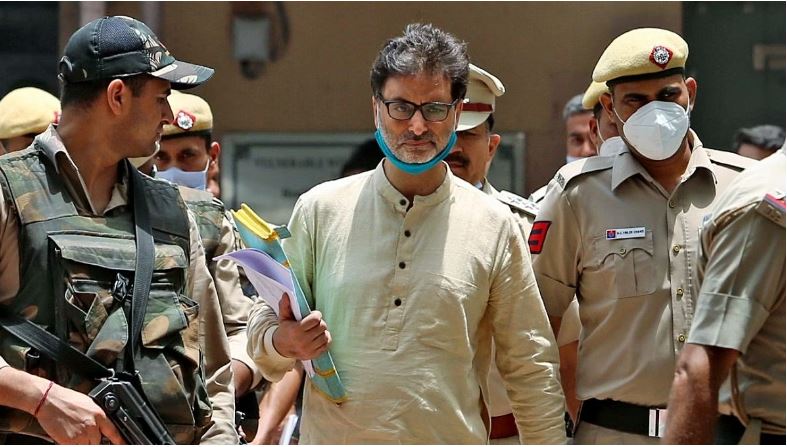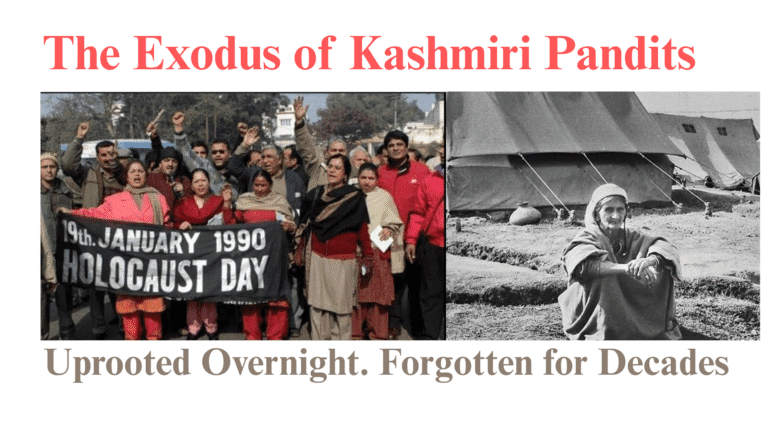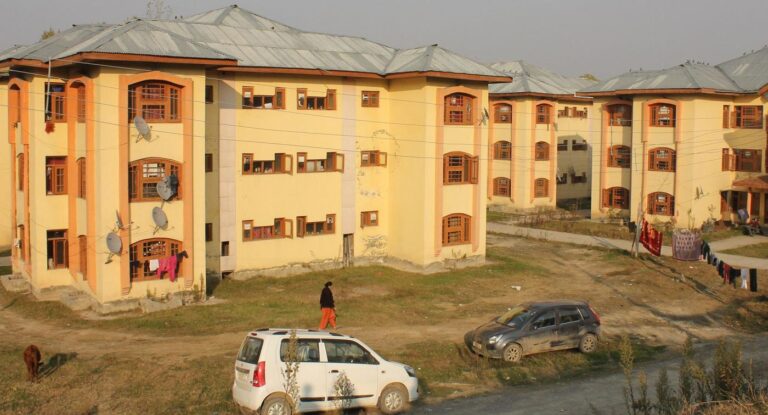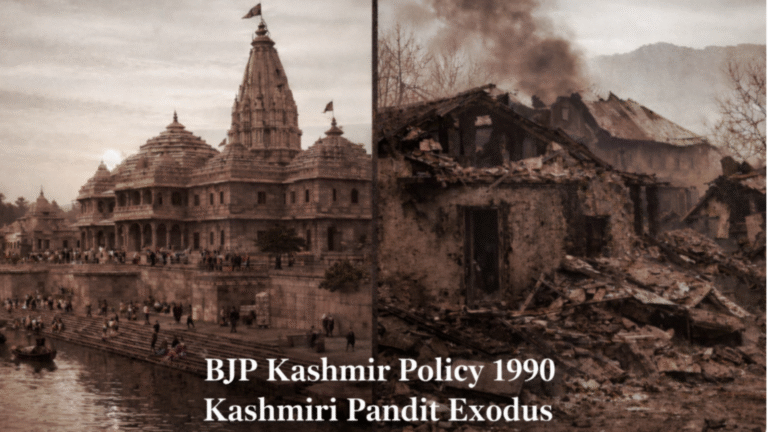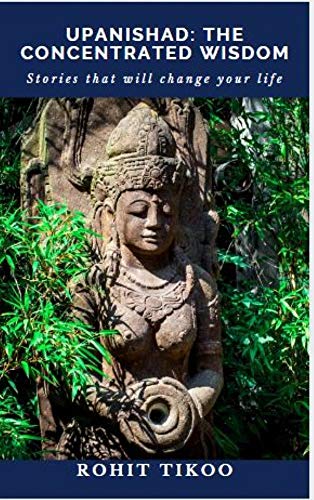The Jammu and Kashmir Liberation Front (JKLF) is a terrorist separatist organization that was founded by Amanullah Khan and Maqbool Bhat. Originally a terrorist wing of the Azad Kashmir Plebiscite Front, the JKLF officially changed its name in 1977 and became an active Kashmiri terrorist organization.
In this article we will discuss the role of Yasin Malik, his life and Conviction
The role of Yasin Malik, left a dark chapter in the tragic Kashmiri history of Pandits. The group’s campaign of violence, terrorism, and intimidation resulted in the forced exodus of thousands of innocent Kashmiri Pandit families from their ancestral homeland.

Image is attributed to India Today
Role of Yasin Malik in Kashmiri Pandit Exodus
The role of Yasin Malik in the exodus of Kashmiri Pandits is a complex and controversial issue. Malik, the chairman of the Jammu Kashmir Liberation Front (JKLF), is accused of orchestrating the mass exodus of Kashmiri Pandits from the Kashmir Valley in the late 1980s. However, Malik has denied these allegations, though Kashmiri pandits know his role as the most horrific, and the affected families are still awaiting for the justice.
Yasin Malik’s actions during the disturbing period of 1989-1990 left a wounding mark on the lives of Kashmiri Pandits, forever altering the socio-cultural fabric of the region in a negative way. Malik, the chairman of the Jammu Kashmir Liberation Front (JKLF), was a key figure in the Kashmiri Pandit exodus. He was accused of orchestrating the mass exodus of Kashmiri Pandits from the Kashmir Valley in the late 1980s.
The exodus was a result of a number of factors, including the rise of radical terrorism in the Kashmir Valley, the failure of the Indian government to protect Kashmiri Pandits, and the fear and intimidation that was created by Yasin Malik and his JKLF. The exodus led to the displacement of over 300,000 Kashmiri Pandits, who were forced to leave their homes and businesses behind.
As we delve into the unsettling story surrounding Yasin Malik, we come face-to-face with a chapter that unveils the human cost of conflict and the consequences of unchecked extremism.
The role of Yasin Malik as the main conspirator in this dark chapter cannot be overstated, as he orchestrated a series of heinous crimes, including the killing of Indian Air Force personnel and the Kidnapping of Rubaiyya Sayeed. It is essential to remember and acknowledge these atrocities as we strive for lasting peace and justice in the Kashmir region.
Yasin Malik: The Man Who Mobilized Funds for Terrorism
Malik’s ability to recruit and mobilize individuals to carry out acts of violence was a major factor in the escalation of violence in Kashmir in the late 1980s and early 1990s. Many of the young people who joined the JKLF were motivated by Yasin Malik’s rhetoric and his promises of a better future for Kashmir. They were also drawn to the sense of belonging and purpose that they found in the JKLF.
His rhetoric was often inflammatory and he made no secret of his desire to see Kashmir separate from India.
One of the most heinous acts
associated with Yassin Malik and the JKLF was the killing of Indian Air Force
personnel. These attacks on armed forces personnel not only caused immense
grief and pain but also fuelled tensions in the region. Yassin Malik’s ability
to radicalize individuals and manipulate them into carrying out such acts is a
testament to his influence.
The killing of IAF officers in 1990 by Yasin Malik
A group of individuals, reportedly led by Yasin Malik, allegedly opened fire on Indian Air Force (IAF) personnel in Srinagar on January 25, 1990.
This incident resulted in four personnel dying and 22 others being injured. After the incident, Yasin Malik was arrested in 1990, and the Central Bureau of Investigation (CBI) filed a charge sheet against him the same year. However, the trial did not progress further and remained unresolved.
Abduction of Rubaiyya Sayeed
Another notorious incident linked to Malik’s reign was the kidnapping of Rubaiyya Sayeed, the daughter of then-Home Minister Mufti Mohammad Sayeed, in December 1989.
The abduction was carried out by JKLF terrorists with the aim of securing the release of imprisoned militants. This act further highlighted the extremist and violent methods employed by the organization under Malik’s leadership.
The incident took place on December 8, 1989, when Rubaiyya Sayeed was travelling in a vehicle with her relatives. Armed militants intercepted the vehicle and kidnapped her, demanding the release of certain imprisoned militants in exchange for her freedom. The abduction created a significant political crisis, with the Indian government facing immense pressure to secure her release.
Please refer to my previous blog for the role of Rubaiyya Sayeed in the kidnapping.
Release of Yasin Malik
In 1994, Yasin Malik was released from custody. In 1995, the High Court issued a stay on his trial. Following his release, Malik divided the JKLF into two factions. He led a non-violent separatist coalition, while the organisation’s founder, Amanullah Khan, continued to lead the violent faction.
Conviction and Imprisonment
The crimes committed by Malik and his involvement in various acts of terrorism did not go unnoticed. On May 25, 2022, a court of the National Investigation Agency (NIA) in Delhi convicted Malik on charges of terrorism. He was subsequently sentenced to life imprisonment. Rather than contesting the charges, Malik chose to plead guilty, acknowledging his role in the atrocities committed during his tenure as the leader of the JKLF.
Conclusion
The role of the JKLF under the leadership of Yasin Malik, in perpetrating violence against the Kashmiri Pandit community cannot be overlooked. Their actions resulted in the forced exodus and immense suffering of a significant population. Malik’s influence, recruitment strategies, and orchestration of violent acts, including the killing of Indian Air Force personnel and the abduction of Rubaiyya Sayeed, paint a grim picture of his reign of terror.
While the conviction and life imprisonment of Yasin Malik offers some semblance of justice, it cannot undo the pain and loss endured by the victims and their families. It serves as a stark reminder of the importance of fostering harmony, inclusivity, and peace in regions affected by conflict, ensuring that such dark chapters are not repeated in the future.

